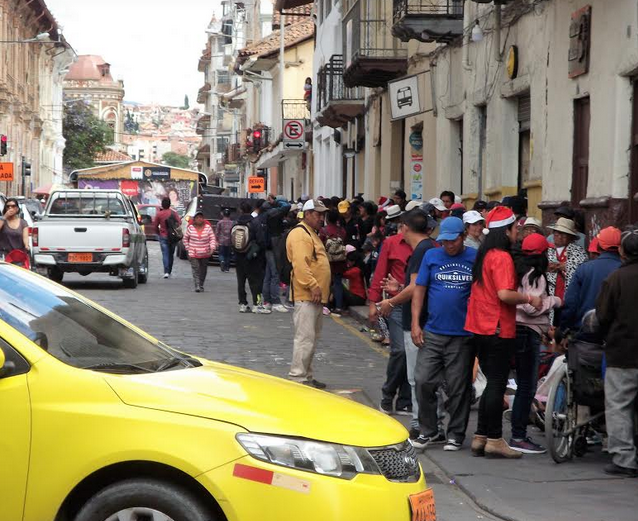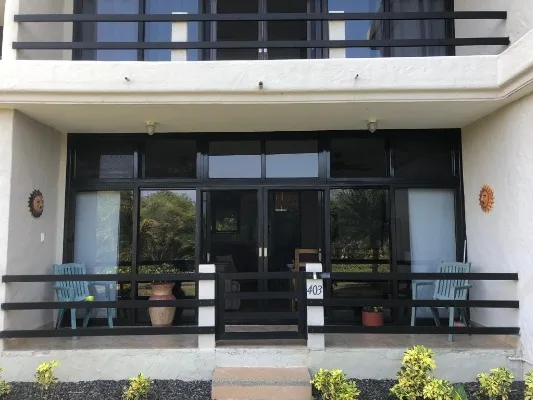A holiday lesson in giving back
By Jeremiah Reardon
I learned a bitter lesson about trust when my first job ended in Gallup, New Mexico. My employer wouldn’t pay me for two day’s casual labor. What can I do? I thought. New in town, I felt at a loss in asserting my right to the meager wages.
Disappointed with my luck, I spread out my sleeping bag in a sheltered spot between Route 66 and the railroad yard on the west side of town. I went to sleep under the stars as I petted my dog. “I got you, Queenie, don’t I? And you got me, huh?” I asked while we listened to the traffic.
sleep under the stars as I petted my dog. “I got you, Queenie, don’t I? And you got me, huh?” I asked while we listened to the traffic.
The warming day under the desert sun woke me. With my gear stored in a backpack, Queenie and I hiked to a church offering free breakfast and a place to clean up.
The memory of having been down and out had popped into my head while I helped to give meals and Christmas gifts at Papeleria y Libreria Pacheco, a stationery store in Cuenca’s historical district. A few hundred indigenous people of Ecuador’s Andean highlands had assembled for their chance to accept food and a gift.

A crowd gathers for food and gifts.
The year before, I had happened upon this scene as I walked into town to attend the Paseo del Nino parade. I took pictures of the endless line of people on Padre Aguirre where it intersected with Calle Larga in Cuenca’s Spanish colonial downtown.
Paseo del Nino or The Passing of The Child is the annual Andean festival which brings out the finest creativity, dress and food of church parishes and community groups in the surrounding Azuay Province. It begins a round of celebrations which extend until Carnaval.
Venerated statues of the infant Jesus are displayed by the faithful upon decorated horses and vehicles laden with plucked chickens, roasted pigs and fruit arranged with flowers and candy. This sometimes-ostentatious display symbolizes gifts which the Three Kings presented in adoration of the Infant. 200,000 visitors attend the festival, some of whom rely upon charity.
I make the occasional purchase of a pen at the stationery store because it’s in the same block where I attend Cuenca Writers Collective Wednesday afternoon. Just before Christmas, I mentioned to the young woman at the counter that I had photos of the previous year’s charity. She was pretty with long black hair, wore silver earrings and spoke English. I introduced myself and suggested that I email them. She wrote out her email address and gave her name as Melissa.
She introduced me to Rosa, her mother who sat on a stool in the center of the store with the contents of a carton in piles upon the white tile floor. I greeted her in Spanish, repeating how I would email last year’s photos. She smiled in appreciation which revealed a gold-capped tooth. Her brown hair with blonde highlights swept in waves around her upturned face. Rosa asked if I wanted to help on Christmas eve and I agreed. The thought of doing good for others made me happy.

The mood in the store was festive on Christmas Eve.
When I arrived, just after 11 a.m. on Christmas Eve, a man sat in a wheelchair at the Padre Aguirre entrance. A woman in indigenous dress sat on a stool and smiled while I took pictures. Her young son stood beside her. Up the street, a line stretched in the shade of adobe and stucco buildings.
Inside the store, Rosa emptied rinsed lettuce leaves into a blue plastic bucket. Three women picked at a huge roasted pig. Its grinning snout pointed out the door. A red table cloth dangled from the beast, stretched out upon a plank supported by boxes. More boxes supported large metal pots of beans and corn, making it easier for the workers to reach. A teenage girl dressed in jeans and a ball cap stacked filled bowls on the floor along the side wall arranged with inspirational pamphlets for sale.
Rosa directed me into the street. Facing the endless line, she said “Jeremiah, tell everyone to stay in line on the sidewalk! No one in the street, ‘por favor’.” She grabbed a bread roll from the top of a box, and gave it to me with a smile. “First, have something to eat.”
Biting into the browned roll dotted with sugar candies I patrolled the line. Two young mothers engaged in conversation walked past in the street. One held her year-old son in a sling at her exposed breast.
The boy playfully tweaked the engorged nipple with tiny fingers. Two young men joined me, one of whom addressed the crowd, “Keep in line, please. No one in the street.” I spotted a city bus coming up Calle Larga and warned people near the corner, “El bus! Cuidado.” Without using his horn, the bus driver looked out his open door at the crowd as he drove slowly up Padre Aguirre, avoiding the pedestrians.
Rosa directed Melissa to pass out numbered paper slips on colored paper. Of course! This is a stationery store, I thought. Rosa would pocket the slip from each one served.
Another daughter, wearing a Santa hat, took charge of the gifts. A popular gift for older people was a blanket, clothing or shoes selected from a pile on the floor. Next to me at the door jamb sat a cardboard box filled with dolls and pretend grooming sets. A favorite for children were plastic balls. From time to time, a man would replenish our supply with another huge bag. I wondered where these gifts came from but had no time to ask.

Mom carves the pig.
Rosa and I stood on the sidewalk at the entrance door step. I handed her both a roll and a small bag of cookies and candy. Rosa would have a bowl in one hand and place the other on top to secure the roll and plastic bag. We must have handed out more than two hundred fifty in two intense hours.
Our charity attracted a drunk. He stumbled up to the doorway and mumbled as he tried to keep his balance. An older man on the sidewalk addressed him calmly, “You have to go to the end of the line and take your turn.” The guy persisted for a few minutes but no one would pay attention to him and he wandered off.
Her hands full, Rosa erupted in laughter when a mischievous boy on the sidewalk swatted her butt with a bowl. About three years old, he wore a parade outfit including a sequin jacket over an embroidered white shirt, black pants embroidered with gold stripes down the legs, and sandals. We all joined in on his joke, laughing at the mischievous little guy as a man ushered him into the store. Rosa’s grandson? I imagined.

A dutiful helper poses for a picture.
My job kept me focused on coordinating my movements with Rosa’s. I watched as meals were passed to Rosa, and had rolls and cookies at the ready. Occasionally, I would look up Padre Aguirre to see if the crowd had thinned out. No such luck; it always looked the same.
Melissa passed out cups of water to the workers at the halfway point. I drank mine quickly and passed a cup to Rosa. Taking a long drink. the last drops of water dribbled down her chin.
Toward the end of our work, three gringos approached. I looked over my shoulder to see them standing and smiling in the street. One wore a Santa hat and waved a fan of twenty dollar bills. “This is for Christmas next year,” he announced handing the bills to an astonished Rosa. The work came to halt as Rosa pocketed the money and said, “You are so kind to give this, ‘señor’. Here, please take these bowls of food with you.” They gladly accepted them and we resumed our work in good cheer.
After two hours the carcass looked skeletal except for the head. We volunteers left our posts and stepped into the store to assess what remained. The line of patient people had now become a grasping multitude at the doors, pleading with hands extended . We passed out toys, blankets, balls, rolls and cookies.
When I said goodbye to Rosa, a man asked, “Why don’t you come next year?” We shook hands as I promised that would. It felt special to be the only gringo on the crew.
A woman seated at the pig extended to me a bowl with leftover pork. “’Gracias, señora’,” I said. Once out the door, I relinquished it to a man standing on the sidewalk.
I knew he needed it more than me because I had once been that guy thirty years ago: hungry and a stranger in town with little sense of hope. That day in Gallup with Queenie hadn’t crossed my mind in years. But helping Rosa feed the crowd had brought it back to me. How grateful to her I felt for this opportunity to give back to others at Christmas.
_________________
Jeremiah Reardon and his wife Belinda retired in 2013 and moved to Cuenca from Monterey, California. His interests include carpentry, furniture-making, acting and photography. Together, he and Belinda enjoy the Cuenca symphony, “ferias,” the “Spoken Word,” and art gallery openings. Click here to read his blog.





















